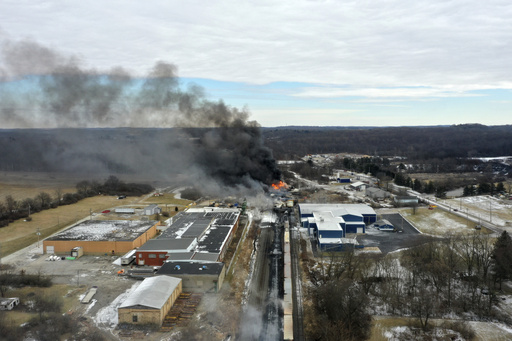Residents near the East Palestine train derailment, which occurred in February 2023, are still eligible to receive compensation for personal injuries despite an ongoing appeal that has placed a $600 million class action settlement with Norfolk Southern railroad on hold. According to a representative for the legal team that represented the affected community, the structure of the settlement allows individuals to access these payments even as challenges about the fairness and adequacy of the settlement are being resolved. However, specifics regarding how much of the settlement will be allocated for these payments remain undisclosed by the attorneys. This settlement was approved by a federal judge last month.
The lawyers have not provided detailed information on the total number of claims—approximately 55,000—that were submitted, nor how many pertain to personal injuries versus property damage claims. Additionally, the amount each claimant can expect to receive has not been specified, though only 370 households and 47 businesses opted out of the settlement deal.
Eligible residents living within a 10-mile radius of the derailment can receive up to $25,000, provided they forfeit their right to pursue further legal action if they develop health issues like cancer. For property damage, the settlement allows for larger claims of up to $70,000 for households within two miles of the incident, with compensation tapering off as distance from the site increases, reaching out to a maximum of 20 miles.
One certainty within the settlement is the judicially approved $162 million in legal fees, a sum that will remain unchanged unless the settlement itself is overturned on appeal. Residents are still in the dark regarding their individual compensation amounts, as their claims undergo evaluation. Importantly, any financial settlements will be adjusted based on prior assistance provided by Norfolk Southern, including funds for relocating families and compensating losses caused by the incident. Moreover, some attorneys not involved in the primary class action have sought to claim a portion of any payouts residents receive.
So far, administrative costs have consumed about $18 million of the settlement fund, with indications that this could rise by at least $825,000 due to the necessary separation of personal injury payments from property payments, as outlined by the class action attorneys.
The initial appeal launched by the Rev. Joseph Sheely stirred up contention within East Palestine, with a portion of the community expressing frustration over delayed payments. Although Sheely initially questioned the adequacy of the deal, he later publicly distanced himself from the appeal. In a twist, four other residents have since filed their appeal notice, facing possible backlash from their neighbors. Their attorney, David Graham, indicated that the appeals are meant to advocate for fairness in the settlement while underscoring the resilience of residents willing to face criticism.
Just recently, the plaintiffs’ legal team moved to have Sheely post an $850,000 bond before his appeal could progress. However, with the new notices of appeal filed, the necessity of a bond remains uncertain. Those opposing the settlement argue that they felt pressured to accept terms without fully understanding the extent of the contamination they were exposed to when hazardous chemicals were released or during the questionable burning of vinyl chloride that followed.
Some community members remain doubtful about the promises made by the Environmental Protection Agency regarding their safety, compounded by the plaintiffs’ attorneys not sharing findings from their own environmental expert’s testing for dioxins and other hazardous substances. In response to criticism, the plaintiffs’ lawyers have maintained that their extensive research and expert consultations should instill trust among residents despite any concerns about EPA oversight or safety assurances.
Graham emphasized that the personal injury compensation, in particular, may fall short for many residents, as potential medical expenses could quickly exceed the allotted payments if serious health problems arise. As part of a separate agreement with the federal government, the railroad company has committed to covering $25 million for 20 years of medical examinations for residents; however, this does not include treatment for any illnesses that might manifest, and this agreement still awaits final approval.



